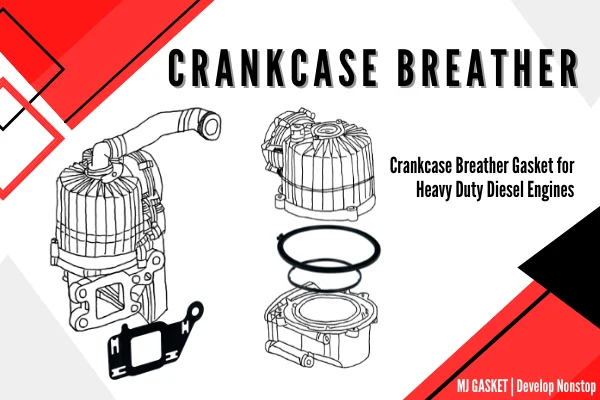Oil escaping from the crankcase breather can signal engine issues. It often indicates excessive pressure building up in the crankcase.
Understanding why oil comes out of the crankcase breather is vital for maintaining a healthy engine. A crankcase breather is an essential component of an engine’s ventilation system. It allows gases to escape, preventing pressure buildup that can disrupt engine performance and cause oil leaks.
Normally, these gases contain a mist of oil that the breather expels. However, if this turns into a flow of oil, it could point to worn piston rings, blocked passages, or a malfunctioning positive crankcase ventilation (PCV) valve. Keeping an eye on the crankcase breather’s output helps in early detection of potential engine problems, ensuring timely interventions to prevent more severe damage. Regular maintenance checks are crucial to ensure the longevity and optimal performance of your vehicle’s engine.

Credit: www.youtube.com
Introduction To Crankcase Breathers
Crankcase breathers play a crucial role in engine health. These components manage pressure and expel harmful gases. They ensure that an engine runs efficiently. When things go wrong, oil may escape through the breather. This could signal a problem.
Purpose Of A Crankcase Breather
Every engine needs to maintain balance. Crankcase breathers help with this. They release pressure from the engine’s crankcase. They also prevent buildup of condensation and gases. This is essential for proper engine function.
Symptoms Of Oil In The Breather
- Excess smoke from the exhaust
- Oil leaks around the engine
- Decreased engine performance
- Increased oil consumption
Finding oil in your breather can indicate wear. It may also suggest a part failure. Timely action can prevent more damage.

Credit: www.reddit.com
Root Causes Of Oil Leakage
Discovering oil leakage from your crankcase breather can be troubling. It often points to deeper issues within your engine. Let’s explore the root causes of this problem.
Worn Piston Rings
Piston rings play a crucial role in your engine. They seal the area between the piston and the cylinder wall. This seal prevents oil from entering the combustion chamber. Over time, these rings can wear out. When this happens, oil escapes past the rings and into the combustion chamber. From there, it can travel to the crankcase breather, leading to leakage.
- Signs of worn piston rings include excessive oil consumption and smoke from the exhaust.
- Regular engine checks can help identify this issue early.
Elevated Crankcase Pressure
Sometimes, the problem isn’t with the piston rings but with crankcase pressure. This pressure can build up for several reasons:
- Blocked crankcase ventilation system.
- Excessive blow-by gas due to worn cylinder liners or rings.
This increased pressure pushes oil through the breather. It can cause leaks and affect engine performance.
| Cause | Effect |
|---|---|
| Worn Piston Rings | Oil leaks, smoke, high oil consumption |
| Elevated Crankcase Pressure | Oil leaks, reduced engine performance |
Understanding these causes helps in addressing oil leakage effectively. Early detection and repair are key to maintaining engine health.
Diagnosing The Issue
Oil leaks from the crankcase breather can be troubling. They suggest engine problems. A correct diagnosis is crucial. It ensures effective repairs. We’ll cover key diagnostic steps here.
Visual Inspection
Start with a close look. Check for oil traces around the breather. Look for signs of overfilling or contamination. Check hoses and connections for damage. Spotting external factors is vital.
- Check the breather: Look for clogs or damage.
- Oil level: Verify it’s correct.
- Hose connections: Ensure they’re secure and intact.
Compression Tests
A compression test can reveal much. It checks the engine’s health. Low compression means worn internals. This can cause crankcase pressure issues.
| Cylinder Number | Compression Reading |
|---|---|
| 1 | Good |
| 2 | Low |
Perform the test on each cylinder. Record the readings. Compare them to the manufacturer’s specs. Large discrepancies indicate problems.
Immediate Solutions
Oil leaking from the crankcase breather needs quick attention.
Let’s explore some immediate solutions to this issue.
Checking The Oil Level
First, ensure the oil level is correct.
A high oil level can cause leaks.
Use the dipstick to check the oil.
Wipe it clean, insert it, then pull it out again.
Oil should be between the min and max marks.
If overfilled, drain the excess oil.
Temporary Fixes
Sometimes you need a quick fix.
Here are some temporary solutions:
- Use a catch can to collect excess oil.
- Secure hoses with clamps for a tight fit.
- Replace any worn breather filters.
Remember, these are short-term fixes.
Consult with a mechanic for a permanent solution.
Long-term Repairs
Oil leaking from the crankcase breather needs long-term fixes. Let’s explore.
Replacing Piston Rings
Piston rings seal the engine’s combustion chamber. Over time, they wear out. This wear leads to oil escaping into the combustion chamber. It then exits through the crankcase breather.
Here are steps to replace piston rings:
- Remove the engine from the vehicle.
- Take off the cylinder head and oil pan.
- Push the piston out of the cylinder.
- Remove old piston rings.
- Install new rings.
- Reassemble the engine.
Tools needed include a wrench, piston ring compressor, and pliers.
Crankcase Ventilation System Overhaul
The crankcase ventilation system reduces pressure. It also removes fumes. A faulty system pushes oil out of the breather.
An overhaul involves these steps:
- Check the PCV valve. Replace if needed.
- Clean all hoses and passages.
- Inspect the breather filter. Replace if dirty.
This fix ensures the system works right. It stops oil leaks.

Credit: www.mjgasket.com
Preventive Measures
Finding oil in your crankcase breather can be worrying. It often hints at underlying issues. Yet, with proper care, you can prevent this problem. Let’s explore some effective measures to keep your engine healthy and oil-free where it shouldn’t be.
Routine Maintenance
Regular check-ups keep engines happy. They catch small problems before they grow.
- Check the air filter often. Replace it if dirty.
- Inspect breather hoses. Look for cracks or damage.
- Monitor engine performance. Note any changes.
Using Quality Engine Oil
Good oil protects engines. It reduces wear and prevents leaks.
- Select the right oil grade. Refer to your manual.
- Opt for high-quality brands. They offer better protection.
- Change oil on schedule. Never skip or delay.
When To Seek Professional Help
Oil leaks from the crankcase breather can signal serious engine issues. These problems may need a professional mechanic’s touch. Know when to call for expert help.
Complex Engine Work
Engine disassembly often requires specialized tools and knowledge. Signs pointing to complex issues include:
- Oil color changes to a milky hue.
- Unusual engine noises like knocking or tapping.
- Excessive smoke coming from the exhaust.
Professional mechanics can diagnose and fix these complex problems.
Persistent Issues Despite Fixes
Even after routine maintenance, some issues persist:
- Recurrent oil leaks after new seals or gaskets.
- Consistent poor performance such as stalling or hesitation.
- Warning lights stay illuminated on the dashboard.
These persistent issues suggest deeper engine problems. A trusted mechanic should inspect the vehicle.
Frequently Asked Questions
Why Does Oil Leak From The Crankcase Breather?
Oil leakage from the crankcase breather can occur due to excessive engine pressure or a clogged air filter, causing blow-by gases to push oil out.
What Causes High Crankcase Pressure?
High crankcase pressure is often caused by worn piston rings, cylinder walls, or a malfunctioning PCV (Positive Crankcase Ventilation) system.
Can A Dirty Air Filter Cause Oil Leaks?
A dirty air filter can restrict engine breathing, leading to increased crankcase pressure and potential oil leaks through the breather.
How To Fix Oil Coming From The Breather?
To fix oil leakage, check and replace any faulty PCV valves, clean or replace air filters, and ensure piston rings and gaskets are in good condition.
Is Oil From The Breather A Serious Issue?
Oil escaping from the breather can indicate serious engine issues like worn components or pressure imbalances and should be addressed promptly to avoid damage.
Conclusion
Dealing with oil leakage from a crankcase breather can be a nuisance. Yet, understanding the causes and solutions simplifies the task. Regular maintenance and addressing issues early prevent major engine damage. Remember, a healthy engine is key to a vehicle’s longevity and efficiency.
Keep your engine checked and breathe easy on the road.

















